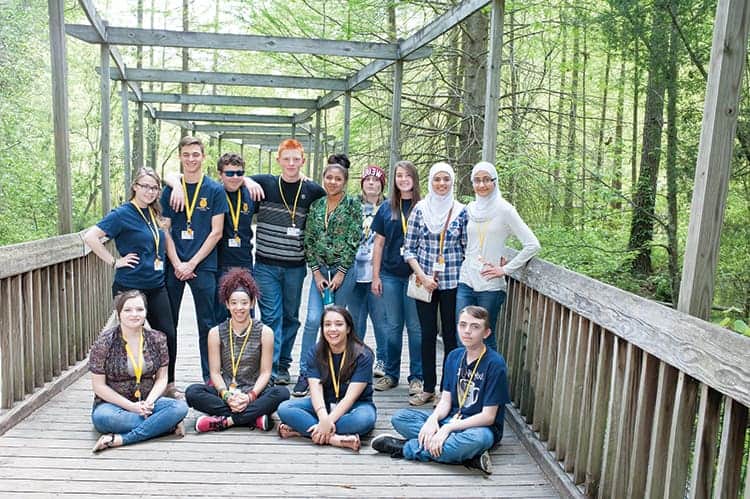Most high school students would jump at the chance to spend half their school day at the local zoo. That’s certainly the case at Asheboro High School (AHS), in North Carolina, where students are participating in a new agricultural education program at the nearby North Carolina Zoo.
For the past 10 years, AHS has partnered with the North Carolina Zoo to give students unique learning experiences through the AHS Zoo School. Students in 10th, 11th and 12th grades can apply for the zoo school, and those who are accepted travel to a classroom and lab facility at the zoo for classes in science, technology, engineering and math.
Teachers and zoo staff work together to create lessons that allow students to observe animals and sometimes go behind the scenes with zookeepers for a closer look. The zoo school has about 130 students enrolled.
“The zoo school has long been a great asset for STEM learning. Last year, we brought our agricultural program on board,” says Elizabeth Pack, agriculture teacher and FFA advisor for the AHS Zoo School program.
In July 2015, AHS launched the Asheboro Zoo FFA Chapter, the only FFA chapter in the National FFA Organization that is headquartered at a zoo.
“We had a chartering ceremony in September 2015, and about 100 people came, including students, parents and school offcials,” Pack says. “It has surpassed all my expectations. Most of our members are urban kids with not much agriculture exposure. We’ve had a phenomenal response from students and our community.”
 The Asheboro Zoo FFA Chapter started with 53 members in the 2015-16 school year. Their goal is to reach 75 members for the 2016-17 school year.
The Asheboro Zoo FFA Chapter started with 53 members in the 2015-16 school year. Their goal is to reach 75 members for the 2016-17 school year.
Students in the zoo school agricultural education program spend half their day at AHS and then take buses to the zoo. There, they take classes such as agriscience applications, horticulture, and environmental and natural resources. Students get hands-on, project-based learning experiences in the zoo’s greenhouses and other green spaces, including a community garden.
“In agriscience, students learn how agriculture impacts their everyday life. The first horticulture class is about plant care, and the second course teaches skills needed in the greenhouse or landscaping industry,” Pack says. “The natural resources class teaches them about things like water and soil quality. They test samples in real-world applications. In our first year, our intro to horticulture team placed fifth at the state level.”
The zoo school is basically a satellite campus of AHS, with a giant mobile unit consisting of five classrooms and a lunchroom.
“Any student can apply for zoo school. In the application process, we look at whether they are motivated to learn, since a lot of what we do is hands-on and student-driven,” Pack says. “It has been rewarding to build relationships with the zoo staff , which allows students to have amazing experiences. We are introducing agriculture to students who never knew about it before. It’s preparing the next generation of people taking care of our environment and managing our food supply.”
Junior Edwin Garcia is president of the Asheboro Zoo FFA Chapter. “In the beginning, I didn’t know how much I would like FFA since I live in the city,” Garcia says. “But I fell in love with it. The meetings and officer interaction feels like home to me. I have always been interested in the environment, recycling and reusable energy, and Mrs. Pack has helped me realize my passion is for the earth, being eco-friendly and helping our planet.”
 Junior Carlee Cagle enjoys the leadership aspect of FFA. “I was super excited about our new FFA chapter because I had heard good things about FFA,” Cagle says. “From our first meeting, it felt like family.”
Junior Carlee Cagle enjoys the leadership aspect of FFA. “I was super excited about our new FFA chapter because I had heard good things about FFA,” Cagle says. “From our first meeting, it felt like family.”
Cagle had dreams of becoming a vet or a pediatrician, but now she is considering becoming an ag teacher.
“I want to make a difference in the lives of students,” she says. “One of our area middle schools is starting FFA, and we are planning to do workshops and mentor them.”
Students at the Zoo School don’t work hands-on with animals due to liability reasons, but they do grow plants for the animals to eat.
“A lot of horticulture happens at a zoo, so we find lots of ways to help,”
While most people think of a zoo as a place for exotic animals, it’s also a great habitat for native plant varieties, providing a perfect hands-on tool for horticulture classes.
Pack says. “We hope to include classes in small animal care and zoology in the future as our ag program grows. We also hope to work with wildlife rehabilitation.”
Pack says she is so proud of her students’ willingness to serve others. “We use the zoo and its employees as a resource, so it’s important to us to show appreciation and give back,” she says. “We have helped them with Earth Day and highway cleanups.”
– Jessica Mozo












